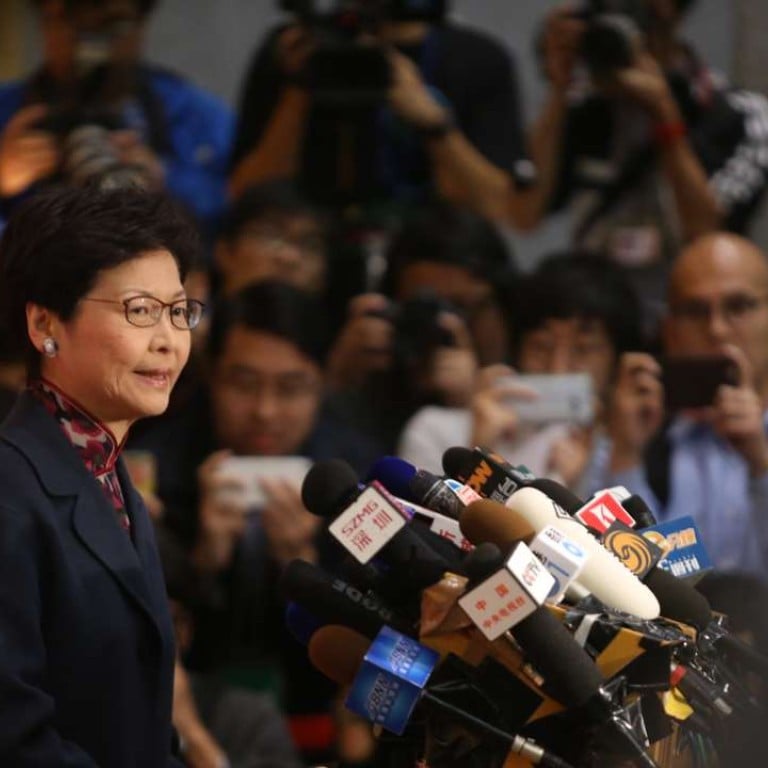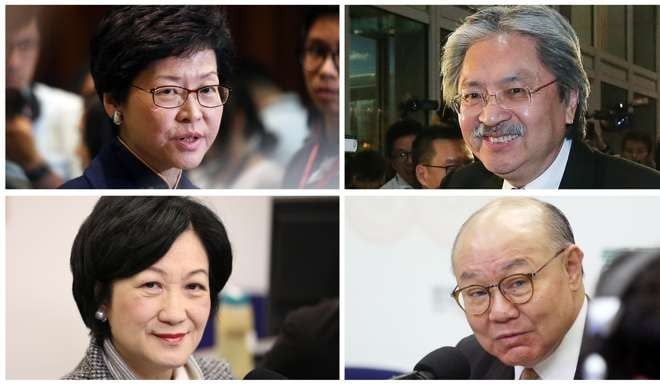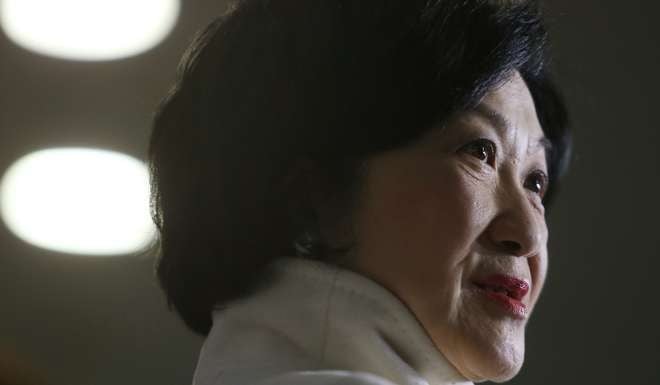
As aspirants for Hong Kong’s top job announce their bids, focus turns to where Beijing’s favour lies
On paper, it looks like Lam is poised for a victory. But with four candidates, there’s still stiff competition to reach the magic number of votes
Now that Carrie Lam Cheng Yuet-ngor has declared her bid for the chief executive post and pundits have labelled her Beijing’s preferred candidate, she must be a shoo-in for the job, a novice watcher of Hong Kong politics might be tempted to conclude.
On paper, it would appear so, but even in a democratically-deficient set-up, choice – and the secrecy of the ballot – has a way of quashing such assumptions. The short history of the chief executive elections has also shown there is only so much Beijing can control.
And in this current election, there is the complicated and unprecedented scope for spoiler votes, as it is now a four-horse race, at least in the first round.
The first to declare his chief executive bid, retired judge Woo Kwok-hing, who is believed to be relying mainly on the pan-democrats for support, has not been seen as a formidable contender since he came forward in October.
The second to do so was pro-establishment lawmaker Regina Ip Lau Suk-yee. Since announcing her bid in December, she has confirmed receiving no signal from Beijing that she should not run. Whether Beijing supports her candidacy, however, is unclear.

John Tsang Chun-wah, whose resignation as the financial secretary was at last approved by Beijing yesterday, is considered an acceptable choice for the pan-democrats. But City University political analyst James Sung Lap-kung said: “Politically, he has not done much to upset too many people. Yet, despite so many years as financial secretary, his track record seems nothing to write home about.”
While all three candidates do not appear to be outright front runners, Sung warned it would be “overly optimistic” to predict at this stage that Lam would “win for sure”, because Beijing’s support could change if surprises came up, if skeletons were unearthed or if loyalist voters in the Election Committee were too divided.
In the 2012 chief executive election, for example, Henry Tang Ying-yen, seen as Beijing’s preferred choice, saw his bid for the top post derailed after the media exposed his cover up of a lavish illegal basement at his Kowloon Tong home. Prior to that scandal, Tang admitted to an extra-marital affair.
The scandals cost him Beijing’s support, while Election Committee members turned against him and instead backed Leung Chun-ying, who was considered a dark horse until then.

The first hurdle the four current hopefuls face is to win the 150 nominations needed from the Election Committee to qualify as formal candidates. The committee has 1,194 members of whom 326 are from the opposition pan-democratic camp, which is unlikely to back Lam. Elected last year, the committee comprises both new faces and members re-elected from previous terms.
A supporter of Lam, who spoke on condition of anonymity, estimated she could win the support of around 100 out of about 220 committee members who had nominated Tang in the 2012 election. In a statement yesterday, Tang, now an Election Committee member, “welcomed and supported” Lam’s decision to run, but said he would first study the candidates’ election platforms before deciding whom to nominate.
Now that Leung has decided not to seek re-election, some of them may not be as keen as before on backing Tsang, and may switch to Lam
Those who nominated Leung in 2012 held on to more than 150 seats in the current Election Committee. Many are believed to back Lam, who said a factor for her to run for the top job was to ensure the continuity of Leung’s policies.
With support from leading leftist groups such as the Federation of Trade Unions and Democratic Alliance for the Betterment and Progress of Hong Kong, which together hold about 160 seats on the committee, Lam should be able to secure enough nominations.
While it was widely believed that Tsang had backing from some business leaders, the chairman of middle-of-the-road political party Third Side, Tik Chi-yuen, a Lam supporter, said some influential figures had previously favoured Tsang just because they disliked Leung.
“Now that Leung has decided not to seek re-election, some of them may not be as keen as before on backing Tsang, and may switch to Lam,” he said.
Tik, also a former Democratic Party lawmaker, estimated that Lam could woo about 30 committee members from the pan-democratic camp.
Beijing’s initial assessment was its “iron-clad votes” in the committee – those who strictly follow its preference in the chief executive race – were about 500.
Professor Ma Ngok, a political scientist at Chinese University, said: “Beijing would possibly do something to help Lam win by a comfortable margin. But in a secret ballot, some members on the Election Committee choose not to follow Beijing’s order, and it will be difficult for Beijing to identify them or do anything to them.”

In 2012, tycoon Li Ka-shing was understood to support Henry Tang, despite then vice-president Xi Jinping attempting to convince him to switch sides.
“The last thing Beijing likes to see is that none of the candidates can clinch more than the 601 votes required to win. But the risk can be high,” Dr Sung said.
Obtaining 600 or more votes is a must even in an uncontested election. The candidate wins if he or she obtains the magic number. Otherwise, the process becomes a rematch, with other adjustments made.
When there are three or more candidates, the contender who obtains more than 600 votes in the first round wins. If no candidates achieve that, the two with the highest number of votes enter a second round the same day.
If still, no candidate reaches 600 votes, there is a third round of voting weeks later on May 7, and then on June 18 if it again fails.
The electoral rules only say the process will be repeated until a candidate is returned.
But for now, all eyes will be on the first process of elimination and the magic number is 150 nominations to get through.


